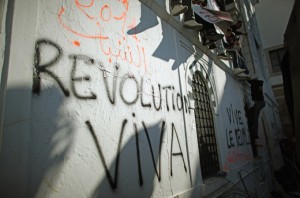 The globalisation of revolution
The globalisation of revolution
Taral Barlaawi
Al Jazeera, 21 March 2011
Revolutions are caused by human agency; not telecommunications technologies, scholar argues.
To listen to the hype about social networking websites and the Egyptian revolution, one would think it was Silicon Valley and not the Egyptian people who overthrew Mubarak.
Via its technologies, the West imagines itself to have been the real agent in the uprising. Since the internet developed out of a US Defense Department research project, it could be said the Pentagon did it, along with Egyptian youth imitating wired hipsters from London and Los Angeles.
Most narratives of globalisation are fantastically Eurocentric, stories of Western white men burdened with responsibility for interconnecting the world, by colonising it, providing it with economic theories and finance, and inventing communications technologies. Of course globalisation is about flows of people as well, about diasporas and cultural fusion.
But neither version is particularly useful for organising resistance to the local dictatorship. In any case, the internet was turned off at decisive moments in the Egyptian uprising, and it was ordinary Egyptians, mothers and fathers, daughters and sons, who toppled the regime, not the hybrid youth of the global professional classes.
Nothing new about globalisation
Are there other tales of globalisation, perhaps those told by rebels and guerrillas?

Click Here to See Personal Page
ROBERT STEELE: Revolution is about the combination of three things: grotesque imbalance combined with evolutionary psychology of a public to the point that the cognitive dissonance is paradigm shattering; a precipitant or catalyst, and the Davies J-Curve, a “sense” on the part of sufficient numbers that there is light ahead, that they might actually win.
When they come–relatively infrequently–revolutions are best supported with information and civil affairs capabilities. A massive public intelligence effort to help the people, the true custodians of their own commons, understand where the wealth is, where the opportunities are, whom to hold accountable; combined with a precision civil affairs effort, ideally manned by individuals who are ethnically and spiritually homogeneous with those they are helping, are the two best things well-intentioned external powers can provide.
 Along with precision information–which no government is capable of today for failure to invest in the open source tri-fecta–comes precision stabilization & reconstruction assistance, of 21st Century Civil Affairs–a civil affairs cadre for a multiniational endeavor that is C4I heavy, truly multinational, and focused on delivering just enough just in time “peace from above.” That too is beyond the capability of any government today, not for lack of capacity, but for lack of mind-set.
Along with precision information–which no government is capable of today for failure to invest in the open source tri-fecta–comes precision stabilization & reconstruction assistance, of 21st Century Civil Affairs–a civil affairs cadre for a multiniational endeavor that is C4I heavy, truly multinational, and focused on delivering just enough just in time “peace from above.” That too is beyond the capability of any government today, not for lack of capacity, but for lack of mind-set.
2012 is a year of Awakening. The traditional colonial powers can remain comatose as they are now, or they can push the “re-set” button and actually participate in what could be the greatest renaissance of humanity in modern history.
See Also:
Strategic Reflections
Greater Democracy: Citizen in Search of a Leader
Reference: Frog 6 Guidance 2010-2020
Seven Answers–Robert Steele in Rome
2010 M4IS2 Briefing for South America — 2010 M4IS2 Presentacion por Sur America (ANEPE Chile)
2009 Perhaps We Should Have Shouted: A Twenty-Year Restrospective
Emerging Basics of Free Internet and Internet for Freedom
Autonomous Internet [Open, Free, Distributed]
Internet Work-Arounds for Egypt Updated
Strategic Phasing Toward World Brain & Global Game
Basics of Revolution
Preconditions of Revolution in the USA Today
Graphic: Pre-Conditions of Revolution
1992 MCU Thinking About Revolution
Graphic: Human Intelligence (HUMINT) 101 (Wrong Way)
Graphic: Human Intelligence (HUMINT) 102 (Right Way)
Review: Radical Man–The Process of Psycho-Social Development
Core Readings on the Power of the Public
Review: A Power Governments Cannot Suppress
Review: The Power of the Powerless–Citizens Against the State in Central-Eastern Europe
Review: The Unconquerable World–Power, Nonviolence, and the Will of the People
Context Reading
Worth a Look: Book Review Lists (Negative)
Worth a Look: Book Review Lists (Positive)



